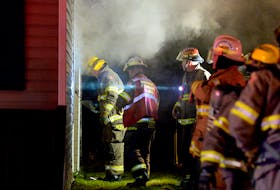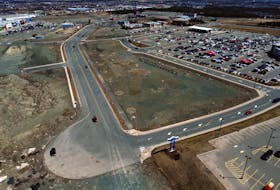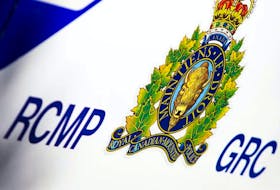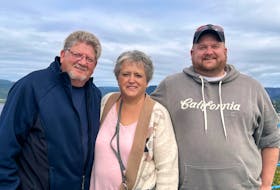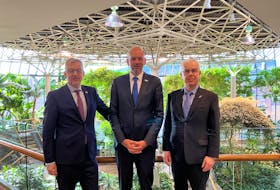
Diane Crocker/TC Media
Greg Moore of ACAP Humber Arm spoke one of the organization’s Costal Matters sessions at Grenfell Campus on Thursday.
On Thursday, Greg Moore, research manager with ACAP, talked about some of that research and its Trading Books for Boats program during a Coastal Matters session, attended by 11 people, at the forestry centre at Grenfell Campus.
Prior to his presentation, Moore said one of the main areas of focus this year was on eelgrass restoration.
Last year ACAP conducted a trial that looked at three methods of replanting eelgrass in Gillam’s Cove. Following on some positive results, this year they tried another replant in Gillam’s Cove and expanded to Wild Cove, a bit closer to Corner Brook.
ACAP has a designated donor bin in Brake’s Cove from which it takes eelgrass and then replants in areas where it’s diminishing.
This year ACAP conducted a hand transplant of eelgrass. Moore said divers went in and removed the eelgrass and then it was replanted by hand at both sites.
They also used a seed dispersal method, to try and get some of the seeds produced by eelgrass to drop down and germinate and restore some of the eelgrass.
Moore said the work is important as eelgrass provides a habitat for fish species, including juvenile cod found along the shoreline, and shorebirds.
It also helps to reduce wave action in shoreline areas by acting as a buffer to protect from erosional events.
While ACAP works to restore one species, it’s also trying get rid of another.
Efforts to eradicate green crab from the Bay of Islands focused this year on a bait preference study in two sites — Pettipas Cove near Summerside and along the shoreline in Irishtown.
“To try and see if there was a specific bait which would help capture these crab more effectively,” said Moore.
ACAP had been using herring, but this year added cod, squid and mussels. Moore said mussels are known food of green crab and the thought was they be more attracted to that bai.
While all resulted in the capture of green crab, Moore said some did better than others. “Right now it looks like cod was the most successful with herring coming in behind it.”

